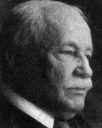W.D. Howells and The Purpose of Fiction
"One of the first of these is the fact, generally lost sight of by those who censure the Anglo-Saxon novel for its prudishness, that it is really not such a prude after all; and that if it is sometimes apparently anxious to avoid those experiences of life not spoken of before young people, this may be an appearance only. Sometimes a novel which has this shuffling air, this effect of truckling to propriety, might defend itself, if it could speak for itself, by saying that such experiences happened not to come within its scheme, and that, so far from maiming or mutilating itself in ignoring them, it was all the more faithfully representative of the tone of modern life in dealing with love that was chaste, and with passion so honest that it could be openly spoken of before the tenderest society bud at dinner. It might say that the guilty intrigue, the betrayal, the extreme flirtation even, was the exceptional thing in life, and unless the scheme of the story necessarily involved it, that it would be bad art to lug it in, and as bad taste to introduce such topics in a mixed company. It could say very justly that the novel in our civilization now always addresses a mixed company, and that the vast majority of the company are ladies, and that very many, if not most, of these young ladies are young girls. If the novel were written for men and for married women alone, as in continental Europe, it might be altogether different.
-- "The Prudishness of the Anglo- Saxon Novel", Criticism and Fiction (1891)
-- "The Prudishness of the Anglo- Saxon Novel", Criticism and Fiction (1891)

Outline of "Novel-Writing and Novel-Reading"
His working hypothesis: "I am exactly like every other novelist" (241).
- Like actors who love to take "note [of] how the thing is done. We forget the shop [. . .] but the shop does not forget us" (242). Authors are essentially performers and makers of a craft.
- The author is his or her own best critic: "Construction and criticism go hand in hand" (242)
- A true, life-like representation of reality is beautiful and cannot corrupt; the imagination can only work with the stuff of experience. Ugliness, by contrast, is what is false and unreal.
- The reader's "own experience of life" is the only test available to the audience.
- Fiction presently takes three broad approaches to representation:
- NOVEL (Austen, Tolstoy) - Characters - The Real - Incidents grow out of characters
- ROMANCE (Hawthorne, M. Shelley) - Types - The Ideal - Allegorical or Ideological
- ROMANTIC NOVEL (Dickens, Hugo) - Characters, who are really types - The Effect - Arbitrary behavior
- The popular audience "are people of weak and childish imagination, please with gross fables, fond of prodigies, heroes, heroines, portents and improbabilities, without self-knowledge, and without the wish for it" (245). Many novel-readers have weak minds, while others are close readers.
- Pleasure and instruction follow from truth-telling rather than the reverse. The novel must "charm their minds and win their hearts. It shall do no good directly."
- Caveat: no imitation of nature can completely hide its artificial nature. It is a made thing.
- Each story/novel has its own fragile life that cannot be violated. "The art is always both a teaching and a learning" (250).
- He admits he doesn't know what gives a novel a lasting quality.
- The problem with the Romantic hero is that most husbands don't perform some deed of heroism to win their wives; instead, they go about the normal aspects of courting.
- Women read for the psycho-ethical referent of characters and stories.
- Fiction "is often a moral stimulus without being a moral influence; it reaches the mind, and stops short of the conduct" (253).
- Realism is not "picturesque or [melo]dramatic." It best accomplishes its purposes when it is historical in method.
- Fiction should seek to make the audience understand (which can result in ethical action),
Questions to consider in conjunction with "Novel-Writing"
- Are Howells' definitions of truth and beauty convincing?
- Is there an objective standard for measuring reality among Howells' authors and readers? Likewise, is there a shared one?
- What separates a "type" in fiction from a "character"? How do we ascertain "realistic" motives?
- What should the reader's responsibility be to the work? What should the author's be to the audience?
- Should fictional be ethical in its message? Will it naturally be so?
- What keeps a story interesting to a reader?
- Do women and men read differently?
Questions to consider in conjunction with "Editha"
- Does Howells' story live up to his own critical standards?
- Is the story realistic? Are the characters? The dialogue?
- How does Editha expect George to live up to the Romantic ideal?
- How does she conceive of her motives towards him?
- How does George live up to yet deny this ideal?
- What role does Mrs. Gearson play in the story?
